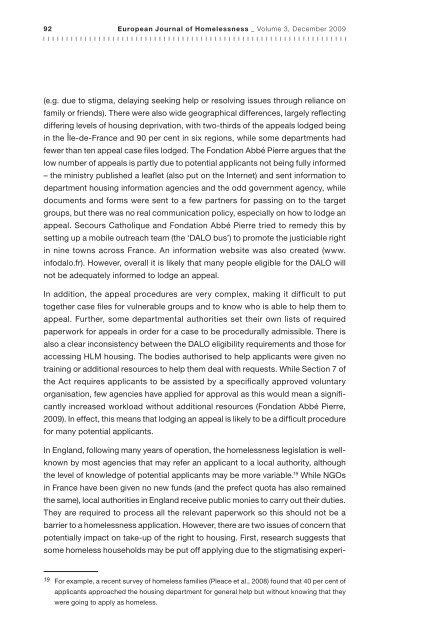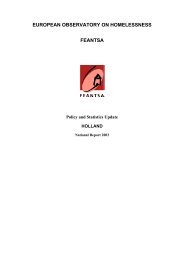Part A - Feantsa - Horus
Part A - Feantsa - Horus
Part A - Feantsa - Horus
You also want an ePaper? Increase the reach of your titles
YUMPU automatically turns print PDFs into web optimized ePapers that Google loves.
92 European Journal of Homelessness _ Volume 3, December 2009<br />
(e.g. due to stigma, delaying seeking help or resolving issues through reliance on<br />
family or friends). There were also wide geographical differences, largely reflecting<br />
differing levels of housing deprivation, with two-thirds of the appeals lodged being<br />
in the Île-de-France and 90 per cent in six regions, while some departments had<br />
fewer than ten appeal case files lodged. The Fondation Abbé Pierre argues that the<br />
low number of appeals is partly due to potential applicants not being fully informed<br />
– the ministry published a leaflet (also put on the Internet) and sent information to<br />
department housing information agencies and the odd government agency, while<br />
documents and forms were sent to a few partners for passing on to the target<br />
groups, but there was no real communication policy, especially on how to lodge an<br />
appeal. Secours Catholique and Fondation Abbé Pierre tried to remedy this by<br />
setting up a mobile outreach team (the ‘DALO bus’) to promote the justiciable right<br />
in nine towns across France. An information website was also created (www.<br />
infodalo.fr). However, overall it is likely that many people eligible for the DALO will<br />
not be adequately informed to lodge an appeal.<br />
In addition, the appeal procedures are very complex, making it difficult to put<br />
together case files for vulnerable groups and to know who is able to help them to<br />
appeal. Further, some departmental authorities set their own lists of required<br />
paperwork for appeals in order for a case to be procedurally admissible. There is<br />
also a clear inconsistency between the DALO eligibility requirements and those for<br />
accessing HLM housing. The bodies authorised to help applicants were given no<br />
training or additional resources to help them deal with requests. While Section 7 of<br />
the Act requires applicants to be assisted by a specifically approved voluntary<br />
organisation, few agencies have applied for approval as this would mean a significantly<br />
increased workload without additional resources (Fondation Abbé Pierre,<br />
2009). In effect, this means that lodging an appeal is likely to be a difficult procedure<br />
for many potential applicants.<br />
In England, following many years of operation, the homelessness legislation is wellknown<br />
by most agencies that may refer an applicant to a local authority, although<br />
the level of knowledge of potential applicants may be more variable. 19 While NGOs<br />
in France have been given no new funds (and the prefect quota has also remained<br />
the same), local authorities in England receive public monies to carry out their duties.<br />
They are required to process all the relevant paperwork so this should not be a<br />
barrier to a homelessness application. However, there are two issues of concern that<br />
potentially impact on take-up of the right to housing. First, research suggests that<br />
some homeless households may be put off applying due to the stigmatising experi-<br />
19 For example, a recent survey of homeless families (Pleace et al., 2008) found that 40 per cent of<br />
applicants approached the housing department for general help but without knowing that they<br />
were going to apply as homeless.




